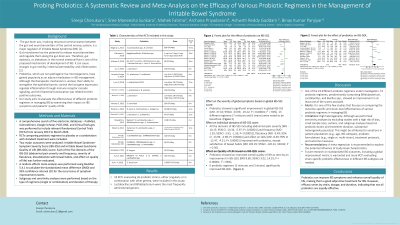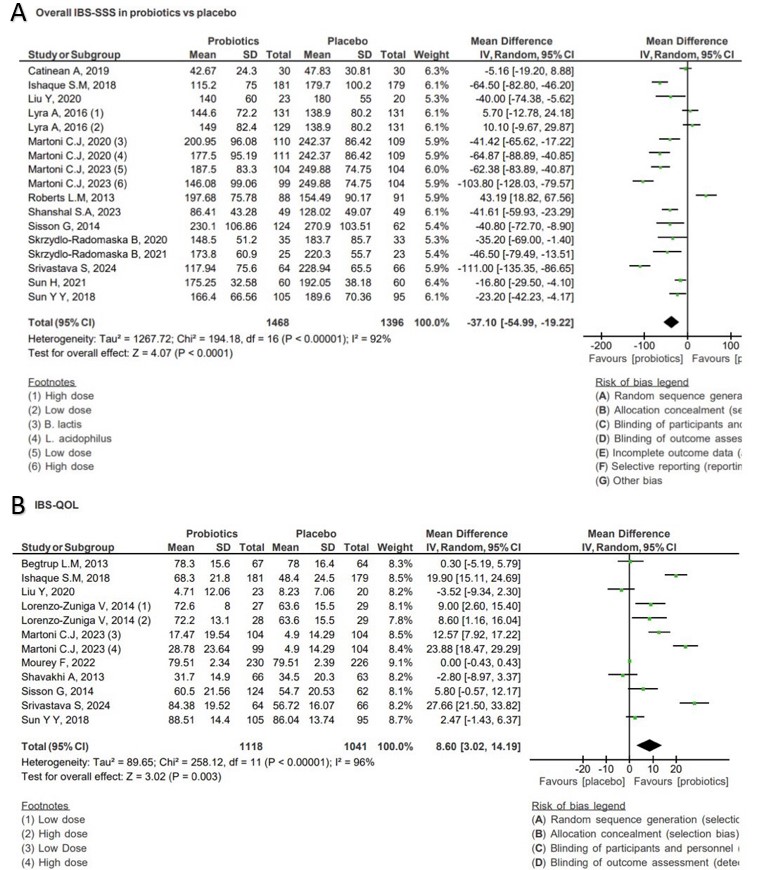Sunday Poster Session
Category: Functional Bowel Disease
P0618 - Probing Probiotics: A Systematic Review and Meta-analysis on the Efficacy of Various Probiotic Regimens in the Management of Irritable Bowel Syndrome
Sunday, October 27, 2024
3:30 PM - 7:00 PM ET
Location: Exhibit Hall E

Has Audio

Sreeja Cherukuru, MBBS
Sri Venkateswara Medical College
Tirupati, Andhra Pradesh, India
Presenting Author(s)
Sreeja Cherukuru, MBBS1, Sree Maneesha Sunkara, MBBS, MPH.2, Mahek Fatima, MBBS3, Archana Priyadarsini, MBBS4, Ashwith Reddy Gaddam, MD5, Binay K. Panjiyar, MBBS6
1Sri Venkateswara Medical College, Tirupati, Andhra Pradesh, India; 2Malla Reddy Institute of Medical Sciences, Ashland, MA; 3Osmania General Hospital and Medical College, Hyderabad, Telangana, India; 4Dr Somervell Memorial CSI Medical College, Missouri City, TX; 5University of Kansas Medical Center, Kamareddy, Telangana, India; 6Harvard Medical School, Boston, MA
Introduction: A key modulator of Irritable Bowel Syndrome (IBS) is the microbiota-gut-brain axis, involving the role of gut flora in altering biochemical signaling between the gut and CNS neurotransmitters. Probiotics can improve IBS symptoms by altering gut flora but efficacy of various genera remains controversial. Our study investigates outcome-specific and strain-level effectiveness of various probiotic regimens in managing IBS.
Methods: We searched PubMed, ScienceDirect, Google Scholar, PLOS ONE, and ClinicalTrials.gov (January 2013 to March 2024) for Randomized Control Trials (RCTs) recruiting adult IBS patients to compare treatment with probiotics versus controls. Two major outcomes were analyzed: Irritable Bowel Syndrome-Symptom Severity Score (IBS-SSS) and Irritable Bowel Syndrome-Quality of Life (IBS-QOL) score. Each of the five domains of the IBS-SSS (abdominal pain severity and frequency, severity of flatulence, dissatisfaction of bowel habits, and effect on quality of life) were further evaluated. We used RevMan 5.4.1 to perform a random-effects meta-analysis using mean difference (MD) with a 95% confidence interval (CI). Subgroup and sensitivity analyses were performed based on the duration of intervention.
Results: 18 RCTs evaluating 26 probiotic strains, either singularly or in combination with other genera, were included in this study. Probiotics showed a significant improvement in global IBS-SSS [MD -37.10; 95%CI -54.99, -19.22; P < 0.00001; I² = 92%]. 13 different regimens (7 mixtures and 6 strains) were noted to be beneficial. All the domains of IBS-SSS including abdominal pain severity [MD -10.15; 95% CI -14.34, -5.97; P< 0.00001] and frequency [MD -2.59; 95%CI -3.93, -1.26; P< 0.00001], flatulence [MD -9.49; 95% CI -13.99, -4.98; P< 0.00001] and effect on QOL [MD -8.49; 95% CI -12.47, -4.51; P< 0.00001] improved with probiotics, except satisfaction of bowel habits [MD 105.29; 95%CI -120.24, 330.82; P = 0.36]. Probiotics also improved overall quality of life as seen by an improvement in IBS-QOL [MD 8.60; 95%CI 3.02, 14.19; P < 0.00001; I² = 96%]. 6 probiotic regimens (3 mixtures and 3 strains) showed a significant improvement in IBS-QOL.
Discussion: 15 probiotic regimens, predominantly comprising bifidobacteria, lactobacilli, and bacilli, showed an improvement in at least one of the scores assessed. Future research on standardized IBS outcomes, including a global improvement metric and more RCTs evaluating strain-specific probiotic effectiveness in different IBS subtypes is needed.

Note: The table for this abstract can be viewed in the ePoster Gallery section of the ACG 2024 ePoster Site or in The American Journal of Gastroenterology's abstract supplement issue, both of which will be available starting October 27, 2024.
Disclosures:
Sreeja Cherukuru, MBBS1, Sree Maneesha Sunkara, MBBS, MPH.2, Mahek Fatima, MBBS3, Archana Priyadarsini, MBBS4, Ashwith Reddy Gaddam, MD5, Binay K. Panjiyar, MBBS6. P0618 - Probing Probiotics: A Systematic Review and Meta-analysis on the Efficacy of Various Probiotic Regimens in the Management of Irritable Bowel Syndrome, ACG 2024 Annual Scientific Meeting Abstracts. Philadelphia, PA: American College of Gastroenterology.
1Sri Venkateswara Medical College, Tirupati, Andhra Pradesh, India; 2Malla Reddy Institute of Medical Sciences, Ashland, MA; 3Osmania General Hospital and Medical College, Hyderabad, Telangana, India; 4Dr Somervell Memorial CSI Medical College, Missouri City, TX; 5University of Kansas Medical Center, Kamareddy, Telangana, India; 6Harvard Medical School, Boston, MA
Introduction: A key modulator of Irritable Bowel Syndrome (IBS) is the microbiota-gut-brain axis, involving the role of gut flora in altering biochemical signaling between the gut and CNS neurotransmitters. Probiotics can improve IBS symptoms by altering gut flora but efficacy of various genera remains controversial. Our study investigates outcome-specific and strain-level effectiveness of various probiotic regimens in managing IBS.
Methods: We searched PubMed, ScienceDirect, Google Scholar, PLOS ONE, and ClinicalTrials.gov (January 2013 to March 2024) for Randomized Control Trials (RCTs) recruiting adult IBS patients to compare treatment with probiotics versus controls. Two major outcomes were analyzed: Irritable Bowel Syndrome-Symptom Severity Score (IBS-SSS) and Irritable Bowel Syndrome-Quality of Life (IBS-QOL) score. Each of the five domains of the IBS-SSS (abdominal pain severity and frequency, severity of flatulence, dissatisfaction of bowel habits, and effect on quality of life) were further evaluated. We used RevMan 5.4.1 to perform a random-effects meta-analysis using mean difference (MD) with a 95% confidence interval (CI). Subgroup and sensitivity analyses were performed based on the duration of intervention.
Results: 18 RCTs evaluating 26 probiotic strains, either singularly or in combination with other genera, were included in this study. Probiotics showed a significant improvement in global IBS-SSS [MD -37.10; 95%CI -54.99, -19.22; P < 0.00001; I² = 92%]. 13 different regimens (7 mixtures and 6 strains) were noted to be beneficial. All the domains of IBS-SSS including abdominal pain severity [MD -10.15; 95% CI -14.34, -5.97; P< 0.00001] and frequency [MD -2.59; 95%CI -3.93, -1.26; P< 0.00001], flatulence [MD -9.49; 95% CI -13.99, -4.98; P< 0.00001] and effect on QOL [MD -8.49; 95% CI -12.47, -4.51; P< 0.00001] improved with probiotics, except satisfaction of bowel habits [MD 105.29; 95%CI -120.24, 330.82; P = 0.36]. Probiotics also improved overall quality of life as seen by an improvement in IBS-QOL [MD 8.60; 95%CI 3.02, 14.19; P < 0.00001; I² = 96%]. 6 probiotic regimens (3 mixtures and 3 strains) showed a significant improvement in IBS-QOL.
Discussion: 15 probiotic regimens, predominantly comprising bifidobacteria, lactobacilli, and bacilli, showed an improvement in at least one of the scores assessed. Future research on standardized IBS outcomes, including a global improvement metric and more RCTs evaluating strain-specific probiotic effectiveness in different IBS subtypes is needed.

Figure: A) Forest plot for the effect of probiotics on global IBS-SSS. The green block represents individual effect sizes, the black line represents 95% confidence interval and the black diamond represents pooled effect size.
B) Forest plot for the effect of probiotics on IBS-QOL. The green block represents individual effect sizes, the black line represents 95% confidence interval and the black diamond represents pooled effect size.
B) Forest plot for the effect of probiotics on IBS-QOL. The green block represents individual effect sizes, the black line represents 95% confidence interval and the black diamond represents pooled effect size.
Note: The table for this abstract can be viewed in the ePoster Gallery section of the ACG 2024 ePoster Site or in The American Journal of Gastroenterology's abstract supplement issue, both of which will be available starting October 27, 2024.
Disclosures:
Sreeja Cherukuru indicated no relevant financial relationships.
Sree Maneesha Sunkara indicated no relevant financial relationships.
Mahek Fatima indicated no relevant financial relationships.
Archana Priyadarsini indicated no relevant financial relationships.
Ashwith Reddy Gaddam indicated no relevant financial relationships.
Binay Panjiyar indicated no relevant financial relationships.
Sreeja Cherukuru, MBBS1, Sree Maneesha Sunkara, MBBS, MPH.2, Mahek Fatima, MBBS3, Archana Priyadarsini, MBBS4, Ashwith Reddy Gaddam, MD5, Binay K. Panjiyar, MBBS6. P0618 - Probing Probiotics: A Systematic Review and Meta-analysis on the Efficacy of Various Probiotic Regimens in the Management of Irritable Bowel Syndrome, ACG 2024 Annual Scientific Meeting Abstracts. Philadelphia, PA: American College of Gastroenterology.
